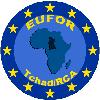PARIS -- U.N. refugee camps in Chad's eastern province now provide shelter to more than 200,000 Darfur refugees and close to the same number of Chadians displaced by their country's civil war. But in the absence of any governmental control over the area, both the refugees and relief workers have been increasingly targeted by border-crossing insurgents, militias, and organized bandits that use the region as safe harbor, exacerbating an already desperate humanitarian crisis. The European Union peacekeeping force currently deploying just inside Chad's border with Darfur was mandated last September by the United Nations to fill the security vacuum that has allowed the armed groups to operate with impunity in the region. The force, known by its acronym EUFOR Chad, has the delicate task of protecting the efforts of the NGO and U.N. relief agencies without compromising their impartiality. Its principle function, therefore, is to maintain a dissuasive presence. But outside of policing the border, which it is forbidden to do, the mission's rules of engagement place no limitations on its use of force. Given the proliferation of armed groups in the area and the complexity of the hostilities among them, the possibility of engagement is a very real one. But if the situation on the ground in Chad promises to be challenging, the biggest hurdle the mission has faced so far has been getting there. Following the Security Council resolution that authorized it, three successive force-generation conferences failed to generate the resources EUFOR Chad needed to operate in the roughly 200,000 square kilometer territory it is tasked to secure. Boots on the ground were fairly easy to come by. Of the roughly 3,700 troops to be deployed, France supplied 2,100, Ireland and Poland came up with an operational battalion of 400-450 each, and more than 10 other nations volunteered anywhere from 20-200 men to help with logistical support.
EUFOR Chad: A Step Forward for European Defense

